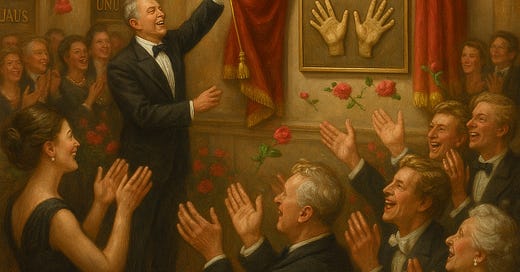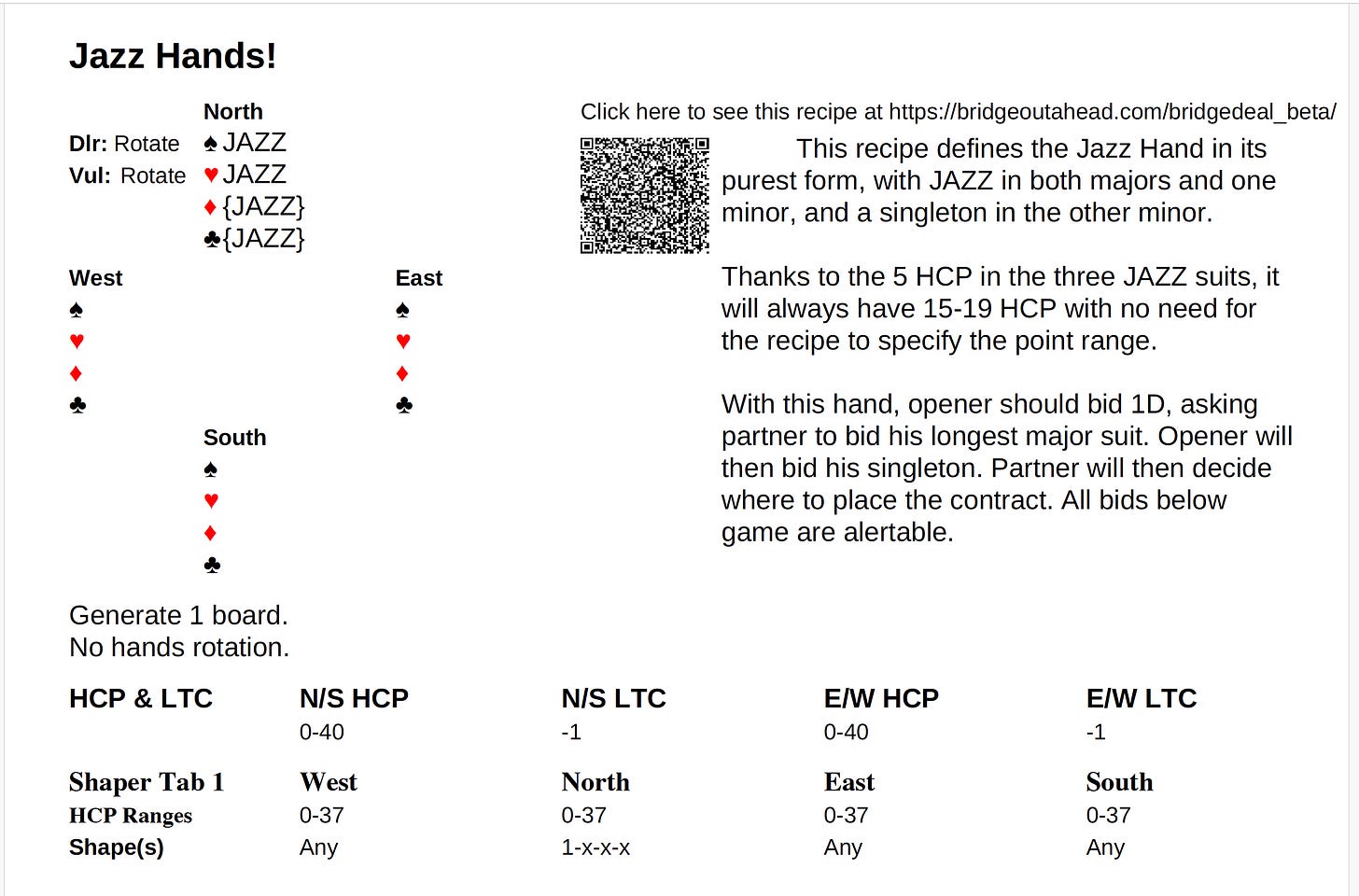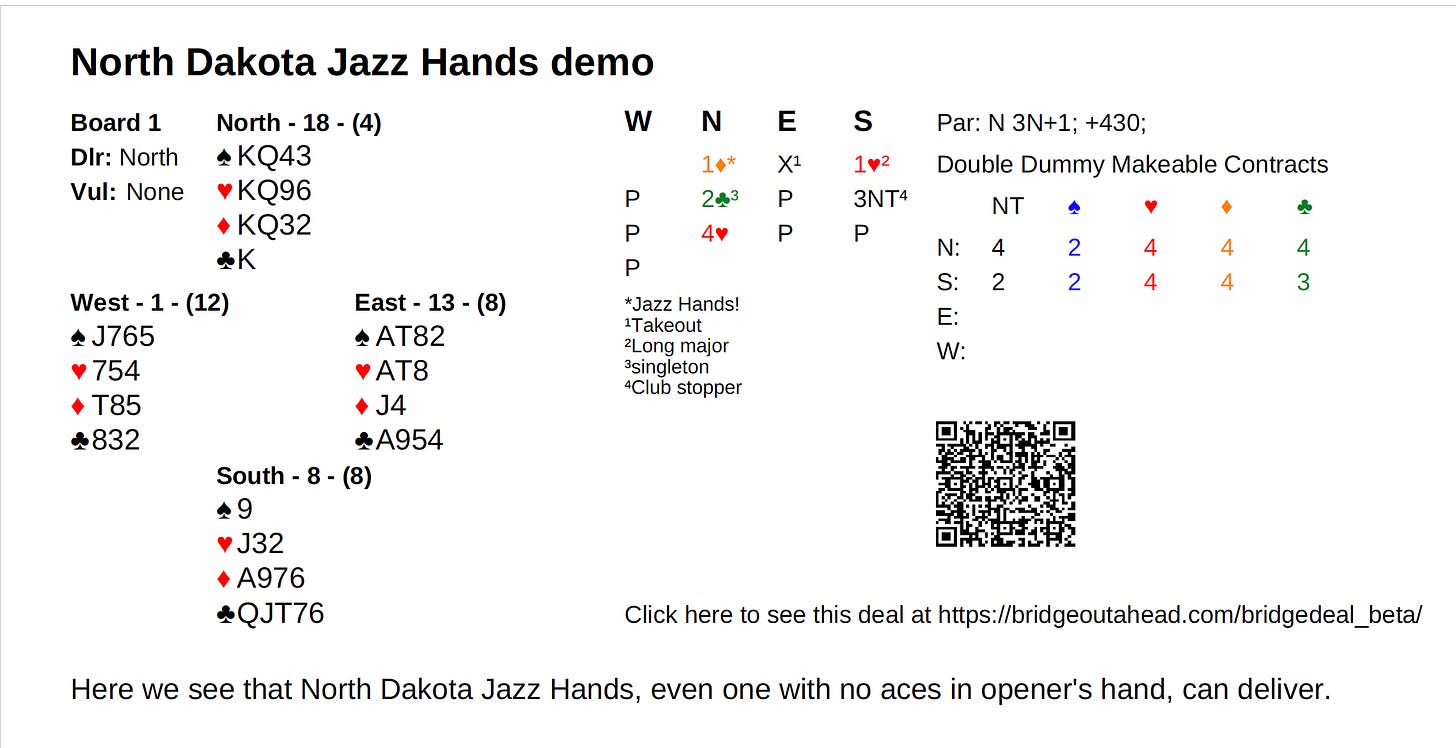Hi, bridge pals.
Now that my bridge deal generator is (nearly, I hope) feature complete, you will be happy to hear that I will now have more time and energy to devote to deal recipe development. To that end, I was planning a systematic approach to designing and storing a set of “starter” recipes—rather like a sourdough starter, in culinary terms—that I and others could draw upon as the basis for all other recipes.
Sound exciting? Maybe not to you, but it is very exciting if, in the past year, every attempt at designing recipes has led you to have to put the generator up on blocks and tinker with its innards for days on end, only to find that it was still not expressive enough. In that light, a long sesh of basic recipe design with no urge to write code is quite invigorating.
So there I was, outlining the most mundane set of 1-level openers, when I realized that you can spell a few words with my Cards placeholders. I realized simultaneously just how easily-distracted I am, but what can you do? (I know: focus; but: make me.)
With just the one vowel (A is for Ace), your word options are rather limited, though you can cheat with digits that look a bit like letters, or with simply leaving out vowels. Also—and I don’t think I have ever revealed this fact—you can key whatever you want in Cards, so really you can spell out anything you like. The generator will ignore characters that are not among its defined set of placeholders and will generate a deal, even from something like this:
But it’s a lot more fun to discover words that use only legitimate placeholders and that result in bridge deals. Words like HAG, BAG, GAB, and ZAGVOID.
Well, during this edifying exploration, I happened upon the word JAZZ and…a convention was born! Not just a recipe, I say to you: a full-fledged convention.
I call it, inevitably, Jazz Hands!
I had not ever thought of making my very own convention, so I can’t say I’ve given this very much thought. However, I have gleaned three basic principles from my study of existing conventions:
Hijack a minor bid; and
Bring on the alerts and announcements; and
It’s better with exceptions/variations.
That second one is super-important. If you don’t insist on alerts and announcements up front, your convention runs the risk of fading into the woodwork, used but not mentioned (e.g. Stayman). That would not do for a showy convention like Jazz Hands!
Lately, I’m big on defining things first in words, then as deal recipes.
The words: Jazz Hands! requires three 4-card suits, each with Ace, Jack, and two spot cards, and one singleton minor suit. The hand must have 15-19 HCP.
Easy enough. Here’s my definition in a recipe report:
You can see I have hijacked the 1D opener, which, if you use Jazz Hands!, will never mean diamonds. Don’t worry! I’m also hijacking 1C to mean no 5-card major, and either minor. This repurposing of 1C, too, requires an alert or announcement—something like, “Either minor—darned if I know.” Don’t worry—we all know that if you really like a minor suit, you can just keep rebidding it until partner gets the message.
The report above outlines the basic bidding. Let’s see it in action with a deal generated from that recipe:
A note on the form of the announcement following the 1D opening bid: If you are going to use this convention, you must commit to delivering the announcement with verve. You may not simply mutter “jazz hands” into your chest. If you have difficulty managing your cards, you may convey the emotion solely through your voice: “Jazz Hands!” But, ideally, you should carefully place your cards (face down) on the table and deliver a Bob Fosse-worthy display of your best jazz hands.
If your opponent subsequently asks for an explanation, you may deliver the technical details calmly, and verbally—that is, sans jazz hands.
Exhibit good taste at all times; prolonged jazz-handing may become annoying.
That leaves the final requirement for a convention: exceptions/variations.
Now, 4-4-4-1 comes up only about 3% of the time. The Jazz Hands! shape and points would therefore be even more rare. What good is a convention if you never get to deploy it? For that reason, I offer up a variation called North Dakota1 Jazz Hands. It looks like this:
It’s still 4-4-4-1, but with North Dakota Jazz Hands, we allow something other than JAZZ into the mix. KQZZ gives you a suit that also has 5 HCP, though (lamentably) it doesn’t spell “jazz”.
Let’s generate a deal and bid it out:
Please note that, while the above deal featured all “KQZZ” suits, the North Dakota Jazz Hands recipe will usually deliver a mix of “JAZZ” and “KQZZ” suit. It all depends on how the placeholder randomizers (brackets, both square and curly) resolve at deal-generating time.
I think the benefits of Jazz Hands! are clear, and I hope to start seeing it appear in clubs and tournaments. All it needs is a bit of momentum and perhaps some fine-tuning, and then we can contemplate ACBL and WBF acceptance. Meanwhile, as in the early days of jazz music, it’s up to individuals to play it and to intrigue others to the point where they, too, wish to play it.
Phew! Back to my 1-level opener starter recipes.
Happy dealing!
The name “North Dakota Jazz Hands” is in honor of radio station KQZZ, call sign of Mix 96.7 FM, which broadcasts the “Best variety of the 90s, 2k, and today…it’s The Mix” to the Devil’s Lake region and points north—even unto Canada, on clear nights. No, it’s not jazz, but if you insist on JAZZ purity you’ll rarely get to play this delightful mix.








